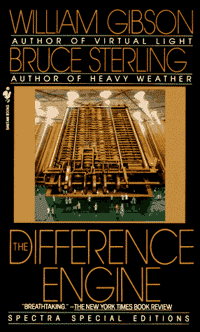For the purposes of getting myself up to speed, I started back mid-fourth, just after the sex scene: Mallory walks a deserted, apocalyptic Whitechapel at dawn. While I'm a big fan of anarchic scenes in fictional texts (Mad Max, anyone?), this imagining really wasn't so imaginative.
Okay, the descriptions of a madman's propaganda were cool, what with seven-cursed whores and pounds of flesh and etc. But, apart from irksome dialogue and some entertaining diversory references ("... Wait, did that just say 'Reverend' Wordsworth?!"), the rest of the iteration is pretty pulpy, full of sound and fury. The ending contains a passage I can't let go, no matter how I wish I could: "A section of roofing collapsed, quite slowly, like the wing of a dying swan."
The image following, of Mallory strolling jauntily through burning wreckage, broken-shoed and blurry-eyed, grinning dreamily, to emerge into a London rain -- that's a relief, a classic Bond-style ending, something canonical with which to end all the campy farce. The iteration gave a lot more, reference-wise, on second reading, but my opinion stays the same: Dreck. Utter.
Mad Max: We don't need no stinkin' moral high-ground.
The way the authors open and close their iterations is worth a moment: I wouldn't identify the choice as stylistically sound. The abstracted, personality-less descriptions of tableaux do nothing to class up the pulpy mid-sections, nor does the rollicking high-energy storyline lend an elegant contrast to the bookends.
While I wouldn't exactly call the presentation "disruptive," this is only by virtue of the whole experience lacking in any immersive qualities. It simply doesn't work for me, and I don't know why the authors chose it.
I see Gibson's cyberpunk style perverted in two directions: I miss the cool, sterile voice of Virtual Light and Neuromancer observing uncomplicated characters moving fluidly between scenes of violence, tension, sex, and awe. Here it's split in two directions: cheesy, faux-clinical analysis marred with single-line paragraphs, and flat, uninviting protagonists inexplicably endowed with moments of inspired action.
Maybe I'm imposing expectations based purely on the relative contexts: people from the past are automatically naive and simple, while people from the future are impossibly complex and subtle. It could just be a reflexive dislike from the overuse of exclamation marks. Too many "cried," too many "Dammes."
Iteration the Fourth, Redux.
Written by Allana on Sunday, October 31, 2010
Subscribe to:
Comments (Atom)



